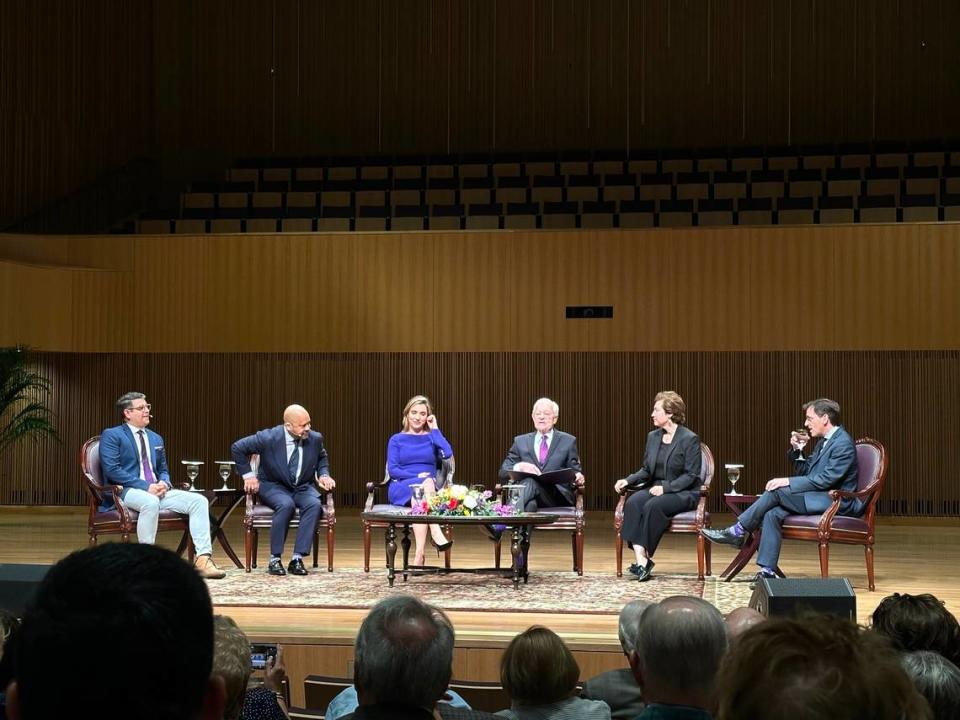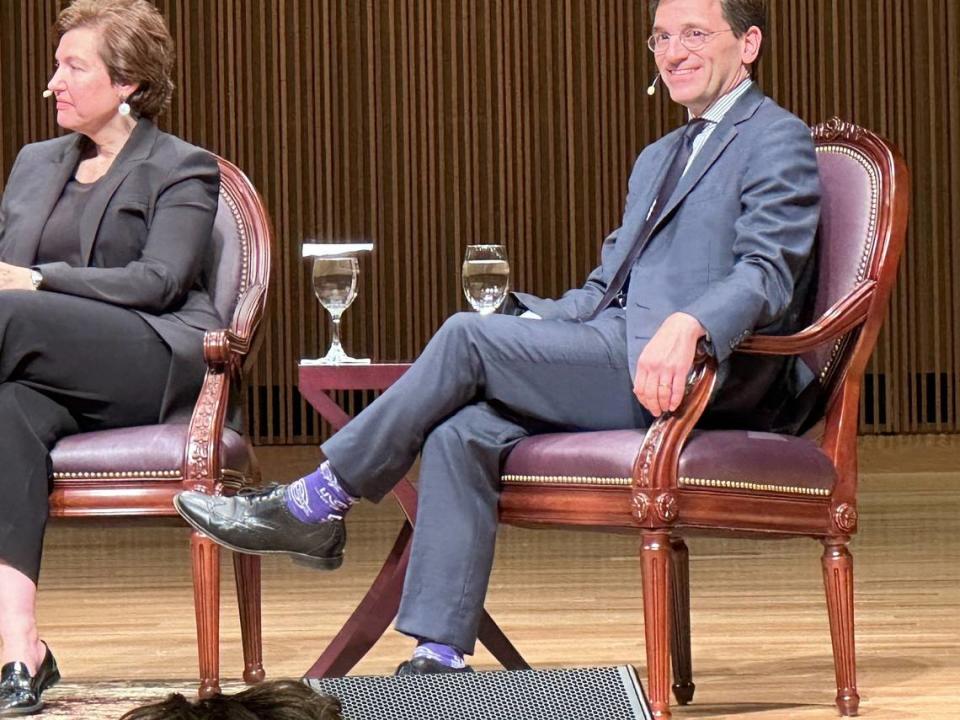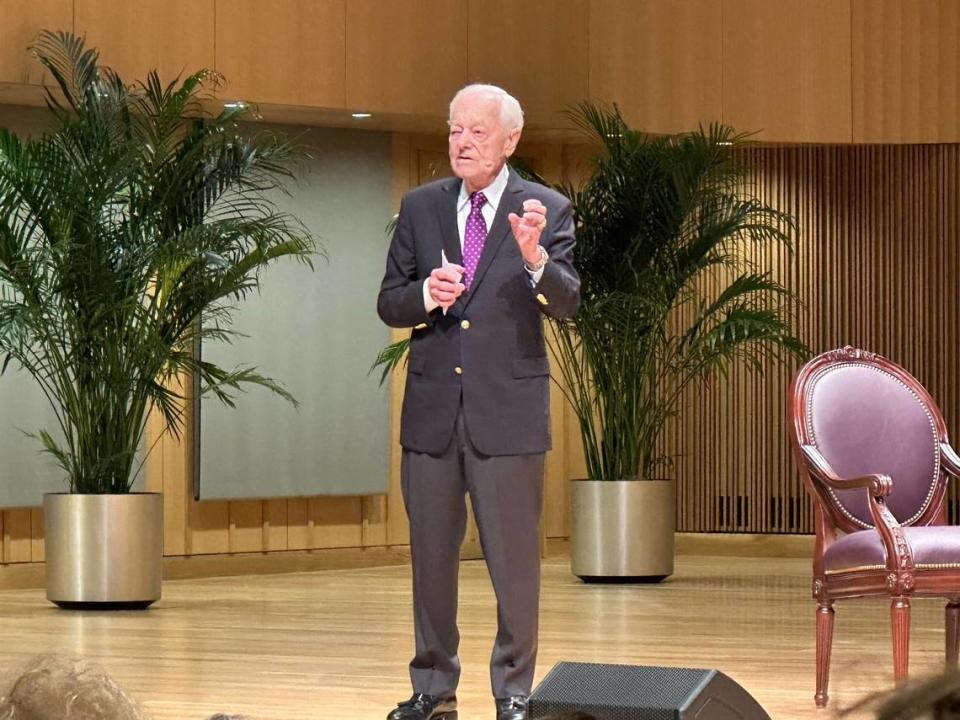You’re not paranoid: The world really is a mess, top journalists at TCU panel say | Opinion
It’s not your imagination: Things are bad in the world and might get worse.
So says a panel of top national journalists covering war, politics and the world, brought to Fort Worth by a legendary newsman to celebrate his legacy at TCU.
“Once you get past World War II, I cannot think of a single year in the United States when we have faced more complicated and difficult problems than what we are facing today,” retired CBS anchor and reporter Bob Schieffer told a crowd of about 400 at his alma mater Tuesday night.
Schieffer grew up in Fort Worth and graduated from TCU in 1959, and his name adorns the university’s College of Communication. For years, he led an annual symposium that brought in top names in journalism to discuss world events, the news business and of course politics, where Schieffer made a huge mark as a White House correspondent and longtime moderator of “Face the Nation,” CBS’ Sunday morning news talk show.

The symposium series ended in 2015, but Schieffer made an encore appearance to celebrate the 10th anniversary of the College of Communication taking his name. (Disclosure: My wife works at the college and was involved in the logistics of the symposium, but not the panel or the content. And I’m a graduate of the TCU journalism department before it bore Schieffer’s name.)
At Schieffer’s prompt, the panelists rattled off their biggest concerns about the world: Americans’ loss of faith in their governing institutions. Gun violence. Lack of trust in the news media. A vacuum as the United States steps back from global leadership. And as New York Times reporter Peter Baker summed it up: an ongoing American identity crisis.
Schieffer singled out negativity in politics.
“If all a visitor from outer space knew about American politics was what he saw in television commercials, he would think we were ruled by idiots, crooks, thugs, people who are mentally imbalanced,” he said.
To which many surely thought: Well, yeah. But as Schieffer noted, it “causes people to lower their own standards about what they think is acceptable.”
The panelists argued that the increasing rancor in American (and global) life is rooted in a lack of shared acceptance of facts or priorities.
“More and more, the onus is on the consumer these days, because there’s so many places you can turn, for you all to choose credible sourcing,” said Margaret Brennan, current host of Face the Nation and a veteran foreign affairs correspondent. She added: “It’s an incredibly dangerous moment.”

Omar Villafranca, a Dallas-based CBS reporter who is also a TCU alumnus, compared the sheer glut of information available through social media and so many news outlets to fast food.
“It’s there, but it’s not really the best for you. And we all know that. But when you get filled up on it, the really good stuff — with context, with source data, that should be trusted, that has been vetted — it’s already been consumed elsewhere, and your opinion is already made up,” he said.
Schieffer lamented that, unlike when he was younger, people are no longer basing their opinions on the same information.
“Now, we not only don’t get our information from the same sources, everyone brings their own source to the argument,” he said.
He was talking about trusted media with processes for finding and verifying news. And he’s right. But I found myself wishing for another panelist to add that many news consumers have seen ample evidence that much of the information from those sources, especially about national politics, is at least one-sided, if not flat out wrong.
Brennan mentioned the glut of bad information about COVID, some of which surely cost people their lives. But it was the national media that faithfully repeated government assertions that the vaccinated couldn’t get the virus. Some trusted outlets declared not only was there no evidence the novel coronavirus leaked out of a Chinese lab, that it was conspiratorial to even ask the question, mainly because President Donald Trump might think the same thing.
In politics, many outlets clearly overstated Russia’s impact on the 2016 election and the involvement of Trump and his campaign. And on the cusp of the 2020 vote, we were told it was impossible that anything on Hunter Biden’s laptop could raise questions about his father because it was all a Russian diversionary tactic.
Sometimes the misinformation is coming from inside the house.
Journalism must reckon with these failures if it is to ever regain public trust. Many people have concluded — with plenty of justification, even if you don’t agree — that if we all have the same sources, we probably aren’t getting the full story.
The panel plumbed the depths of the problems with social media. Schieffer noted that we tend to use technology before we fully grasp its effects.
“Yes, we can send truth around the world and back in two or three seconds,” he said. “But we’ve also made it possible for all the nuts to know where each other are.”
Susan Glasser of The New Yorker noted a point that I’ve long lamented: The constantly connected devices we carry everywhere bring all of the world’s misery to brains that aren’t equipped to handle it. We were never meant to be instantly aware of every war, tragedy and death thousands of miles away.
On world events, the overriding theme was uncertainty, especially with Ukraine and Israel. Glasser noted that wider war in the Mideast was a distinct possibility.
“More conflicts are likely, as powers — whether regional actors or great power competitors to the United States like China and Russia — test the boundaries of a system that doesn’t have” the robust American leadership of the past, she said.

Despite the sobering discussion, Schieffer, who retired from CBS in 2015, punctuated it with sharp observations and questions and humor, often self-directed. After he walked slowly on stage, Schieffer got laughs with a personal disclosure.
He said: “Can I clear up just one thing I know went through all of your minds when I walked out here?”
Pause.
“Eighty-six.”


